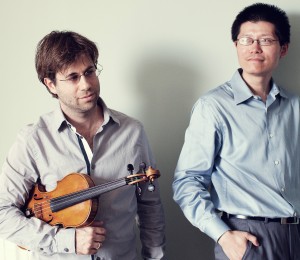
Violinist pays tribute to Piazzolla, master of the tango
Aside from its political and commercial global familiarities (Evita Peron, gauchos, big sides of beef), Argentina can boast major literary figures such as Jorge Luis Borges, Julio Cortázar and even Manuel Puig. It also has some considerable classical musical figures, such as Alberto Ginastera. But the most well-known of its composers worldwide is surely Astor Piazzolla, who turned tango into art music and whose popularity seems to be growing with each passing year.
Tomas Cotik, an Argentine-born violinist resident in South Florida, who is a doctoral student and teaching assistant at the University of Miami, is paying tribute to this composer of his homeland tomorrow afternoon at UM and on Saturday night at radio station WDNA’s Jazz Gallery with a concert of violin and piano music devoted entirely to Piazzolla.
Cotik, whose bachelor’s dissertation at Freiburg University in Germany was about the music of Piazzolla, said the composer has become more appreciated in recent years, especially in Argentina.
“When I was growing up actually, for my generation, it was not popular to listen to tango music or to go to dance tango,” Cotik said. “It wasn’t as understood, tango music. There was this dichotomy of serious music against tango musicians and Piazzolla, with an older generation of tango players not liking what Piazzolla was doing … and there were people from the classical music world not thinking of tango music with too much respect.”
But as he studied in Germany, Cotik said he found himself returning to his own roots and wanting to know more about the composer.
“Besides that I just like it, it’s also interesting to me for all the different musics that he combines,” Cotik said. “He had a lot of influences, from listening to jazz in the clubs in New York, to Italian music, klezmer music, and I think that’s what makes him interesting to so many of us.”
Piazzolla (1921-1992) was the founder of what was known as nuevo tango, or new tango. He studied in New York and Paris as well as Argentina and was a master of the bandoneón, which is a kind of concertina. He played with the tango master Carlos Gardel as a teenager and later founded his own tango ensembles, enjoying a career of wide international success until he had a stroke in 1990.
Cotik’s menu of Piazzolla includes multiple pieces, such as three of his Tango Etudes, originally written for solo flute but here done as solo violin works [Here is Cotik playing Tango Etude No. 3]. Most of the pieces are arrangements of the originals, some of which Cotik did himself.
“It took me quite a while to assemble a program of Piazzolla. When I would go to Argentina, I would buy a lot of music, and I still have a lot of things that, at some point, I might want to arrange,” he said. Some of the pieces on the program were written first for larger instrumental combinations, some are songs, and some, like Le Grand Tango, written originally for cello and piano, will be heard in a violin-and-piano arrangement by Russian composer Sofia Gubaidulina.
The special appeal of Piazzolla lies not just in his melodies and his song forms, but in what Cotik pointed to as its feeling of violence, even of madness. A lot of this can be brought across with attention to dramatic effects, such as ponticello (playing on the bridge), unusual accents, harmonics “on unexpected strings” and a free approach to meter, he said.
Cotik, who is the second violinist of the Delray String Quartet, will be joined by pianist Tao Lin, who teaches at Lynn University in Boca Raton. Lin is a fluid and accomplished pianist who has performed with Cotik before in an all-Schubert program. The two musicians also recorded the Schubert — the Sonata in A, D. 574; the Rondo in B minor, D. 895; and the Fantasie in C, D. 934 — and hope to release it soon.
The second Piazzolla concert, at the WDNA Jazz Gallery, fits right in with the current preference among classical players to do programs in unexpected venues.
“Classical music is not in its very best moment in history, with orchestras folding all over the place,” he said. “We need to be inventive and try to do what we can to keep the work we love alive … This is not a program you hear every day, but it’s what I love doing, and I also hope that it can be my little, little contribution to keep this going.”
Tomas Cotik and Tao Lin can be seen at noon Thursday at the Clarke Recital Hall on the UM campus in Coral Gables, for which admission is free, and at 8:30 p.m. Saturday at the WDNA Jazz Gallery at 2921 Coral Way in Miami. Tickets for the WDNA show are $25; visit www.wdna.org for more information.
Recent Content
-
Artsarticle ·
-
Artsarticle ·
-
Artsarticle ·
